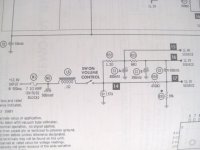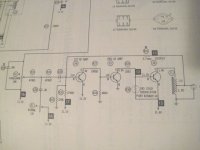Hey Guys,
I'm stumped and hope that someone might be able to lend some knowledge here. I just finished restoring a 1964 Ford Truck transistor radio (model 4TBT) manufactured by Bendix.
I removed the output transistor to clean the aluminum heat sink and repaint the chassis. When I put it back together and went to test the radio the wire-wound resistor (R32) shown in the schematic began smoking. What could be the cause of this?
I would be grateful for any help.
Thanks!
I'm stumped and hope that someone might be able to lend some knowledge here. I just finished restoring a 1964 Ford Truck transistor radio (model 4TBT) manufactured by Bendix.
I removed the output transistor to clean the aluminum heat sink and repaint the chassis. When I put it back together and went to test the radio the wire-wound resistor (R32) shown in the schematic began smoking. What could be the cause of this?
I would be grateful for any help.
Thanks!
Attachments
Thanks for the help. I appreciate it.
I checked the #15 wire and that's good. I suppose I'll need to replace the electrolytics in the can.
Is there any chance it could be wire 13 pictured below? I had to remove that one (to the base of the output) to remove the cover.
I checked the #15 wire and that's good. I suppose I'll need to replace the electrolytics in the can.
Is there any chance it could be wire 13 pictured below? I had to remove that one (to the base of the output) to remove the cover.
Attachments
Wire 13 looks like the NFB loop,Unlikely that it caused the problem.
I'd probably start with replacing the filter caps,they are due for replacement anyways.
I'd probably start with replacing the filter caps,they are due for replacement anyways.
Thanks DJ and true, they should be replaced. What I don't understand is why that resistor was fine before I removed the output then once I replaced it the resistor smoked. Is it possible that I did something to cause a short?
Yea,that's kind of odd.
Was there a mica insulator on the transistor,that got forgotten when it was re-assembled? (Don't worry,we've all done it at least once!)
I Dunno. 😕
Was there a mica insulator on the transistor,that got forgotten when it was re-assembled? (Don't worry,we've all done it at least once!)
I Dunno. 😕
DigitalJunkie said:Yea,that's kind of odd.
Was there a mica insulator on the transistor,that got forgotten when it was re-assembled? (Don't worry,we've all done it at least once!)
Nope. The transistor is a PNP germanium transistor. I made sure I wired them correctly too when I replaced the emitter and base wires. I checked for any grounding and all was good.
maybe you could have just shaken the dried up electros and the metal flakes (which used to be the electrodes) inside the cap and connected both terminals together internally? 😕 could be a possibility. 😀
That makes sense since the caps are almost 45 years old.
I'm going to pull the can today and replace the caps. That will narrow it down.
I'm going to pull the can today and replace the caps. That will narrow it down.
I know it's not C1 because I just replaced the caps with the same result (smoke). I checked the connections and replaced the output transistor and it's still smoking. Any ideas of what should I try next?
have you checked if the transistor is shorted from emitter to collector? if not, check the resistance of the 70ohm thermistor or if it is installed.
The thermistor is 70 Ohms cold. I have no idea what it's value should be at room temp, but too high of a resistance reading will not heat up the resistor, Have you pulled the transistor out of circuit to see if it is leaking? I know they asked about the insulator between the heat sink and the transistor, what about the insulators on the mounting screws?
I've tried several different transistors with the same result. The mounting screws for this particular model don't have insulators for the screws. What I think might have happened is that I'm using a "stand in" Weller soldering iron until my new station arrives. I'm thinking that I may have heated the connector to the emitter too much to desolder the connector and the wire may have separated from the connector.
- Status
- Not open for further replies.
- Home
- General Interest
- Car Audio
- Smoking Resistor?

